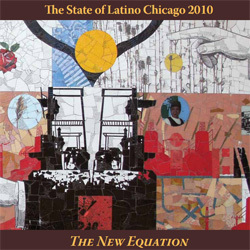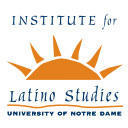
The Latino population of Chicago clearly benefits the economy and does not present a tax burden to local government according to “The State of Latino Chicago 2010: The New Equation,” a report released by the University of Notre Dame’s Institute for Latino Studies (ILS). The Federal Reserve Bank of Chicago hosted a forum Nov. 16 to mark the release of the report.
The report is the second in a series titled The State of Latino Chicago. The first, released in 2005, called “This is Home Now”, provided a general overview of the Latino population in Chicago.
“When we started this research, we wanted to examine the proposition that Latinos do not contribute economically, and that they are costly to local governments,” said Juan Carlos Guzmán, director of research at the ILS. “What we found was surprising and very positive. When you look at the balance of the costs and benefits, the costs of educating Latinos and what they contribute in terms of taxes, the balance is positive.”
The central findings of the report are:
- Latinos contribute almost $1.2 billion more in tax revenues than they cost in the delivery of public services like education, health care and other services like public safety.
- Latinos earned $26.2 billion in 2009, which translates to $12.3 billion in spending power. Latinos’ spending power combined with indirect effects to yield a total impact of $23 billion on the economy of metropolitan Chicago.
- Latinos comprise 22 percent of metropolitan Chicago’s population and 20 percent of its labor force. Latinos are poised to become 25 percent of Chicago’s labor force by 2015.
“This is a community that is growing in size and influence in this region, and we need to understand concretely what the community contributes and what is needed to support the growth of this community in the most constructive way,” said Ngoan Le, vice president of programs for the Chicago Community Trust, who participated in a panel at the report’s launch. “This report adds to our collective knowledge in understanding this community through concrete data, and not by making assumptions. This community contributes a lot to the local economy, and this report documents that contribution.”

According to the report, Latinos earned $26.2 billion in 2009, which translates to $12.3 billion in spending power in metropolitan Chicago once money saved, spent on taxes, or spent outside the region is deducted. When the indirect impact of spending on goods and services is taken into account, that $12.3 billion in Latino spending power yields a total impact of $23 billion on the metropolitan Chicago economy. That $23 billion, in turn, helps to sustain more than 170,000 jobs in the region.
“In economically trying times, with many looking for a scapegoat for our region’s fiscal woes, the Institute for Latino Studies once and for all refutes the notion that Latinos are socioeconomic ‘drains,’” said Sylvia Puente, executive director with the Latino Policy Forum. “Investing in Latinos offers a sound return on investment, helping shape our strong, shared future as a region. With this new study, the Institute for Latino Studies paints a compelling picture of the community’s robust economic contributions.”
The report, which also covers Latinos’ impact on local fiscal coffers, reveals that Latinos paid $4.3 billion in local taxes — mostly on property but also on sales and income — and indirectly contribute another $724 million accounting for taxes paid by businesses as a result of their spending. Weighed against the nearly $3.9 billion paid out in education, health, public safety and other human services, this leaves a positive balance of almost $1.2 billion.

Allert Brown-Gort, associate director of the ILS, said that to the extent that Latinos use government services, it is in significant measure due to the youthfulness of their population — which translates to more education spending.
“The issue is that education — yes, it’s a cost — but it’s also an investment,” he said. “It’s a particularly important investment if you look at how young this population is, and how quickly their share of the population of workers is going to rise. As a society, we need to question whether the replacement workers for those who retire are going to have the educational capacity both to maintain us in retirement as we’d like to be maintained but also to maintain our competitiveness as a country.”
The report concludes by noting that without substantial investments in education, the current structure of the economy makes it more difficult for relatively recent arrivals like Latinos to advance, as compared with past immigrant groups.
“Today’s Latinos are hard-working, young and ambitious, but the knowledge-based and services-oriented economy of the twenty-first century generally demands a level of technical training or educational credentials that many do not possess,” the report says. “If we want to unleash the economic potential of this young and growing population, we need to understand spending on public services such as education not as a ‘drain’ but rather than as investment in Chicago’s future.”
“The future of metropolitan Chicago depends on the successful incorporation of Latinos into the economic, social and political life of the region. Absent deliberate planning, the best-case scenario is that the current pattern of fragmented and uneven progress will continue. However, with well-informed policies and with political will sufficient to match the formidable challenges that lie ahead, Chicago can and will do better.”
The report was released at a forum titled “The Economic Contribution of Latinos in Chicago” with more than 100 policy makers, business, civic and community leaders. The program featured Eduardo Arnal Palomera, Consul General of Mexico in Chicago; Ngoan Le, vice president of programs, Chicago Community Trust; and William Testa, vice president and director of regional research, Federal Reserve Bank of Chicago.
The ILS, in keeping with the distinctive mission, values and traditions of the University of Notre Dame, promotes understanding and appreciation of the social, cultural and religious life of U.S. Latinos by advancing research, expanding knowledge and strengthening community.
The full report can be viewed here.
Originally published by at newsinfo.nd.edu on November 18, 2011.
